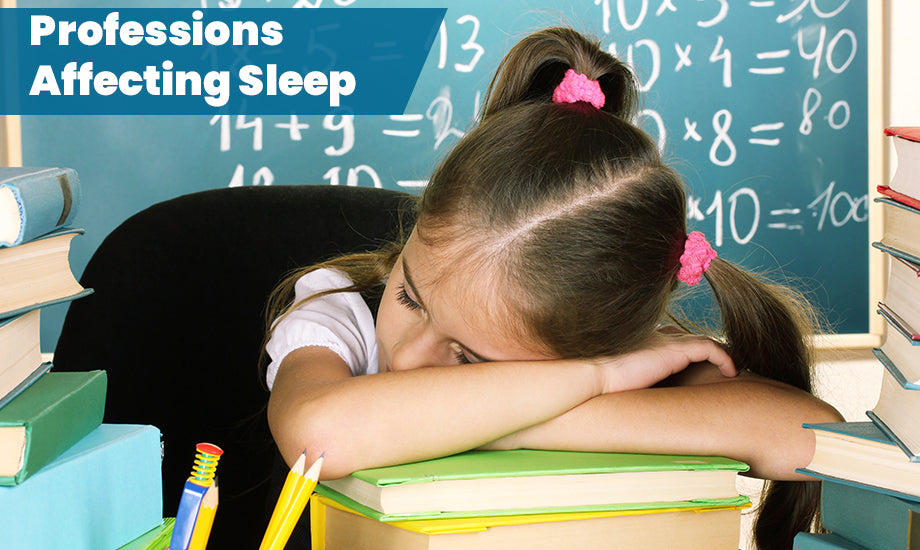
Around 6 out of 10 or 57.8 percent middle school students did not get enough sleep during school nights. That was students from grades 6-8, for the high school students, the numbers are higher (72.7 %) the findings are as per CDC’s recent data. The website clearly reads that the children who get adequate sleep might have fewer behavioral and attention problems. We need to find out why and what needs to be done in this article. Sleep habits are supposed to be built cautiously. Our kids don't get the necessary amount of sleep because of late summer evenings, early school starts, and everyday stress at this tender age. Additionally, lack of sleep frequently has a negative impact on behaviour, academic performance, and health. An undetected epidemic exists.
It is indeed important for children to get enough sleep for their physical and mental health. Lack of sleep can lead to problems with concentration, memory, and behavior, and can also negatively impact overall physical health. It is important for parents, doctors, and school teachers to be aware of the importance of sleep and to encourage children to get sufficient rest. This may involve setting bedtime routines, creating a conducive sleep environment, and limiting exposure to screens before bedtime. It is also important for children to have consistent sleep schedules and to get enough sleep on a regular basis. By prioritizing sleep, parents can help their children to be more alert, focused, and healthy.
Many children are starting their spiral into chronic school-year lack of sleep as the carefree summer days give way to the hard reality of pre-dawn mornings. In this nation, 8 a.m. is considered the typical school start time. To fulfil curriculum requirements, several schools, including a few preschool schools in The City, will ring one‘s first bell 30 to 45 minutes earlier this year than they did last.
Why do school children need to adequately sleep?

School-aged children need sleep for a variety of reasons. Adequate sleep is essential for their physical and mental development, as well as their overall health and well-being.
During sleep, the body is able to rest and repair itself, and the brain is able to consolidate memories and process new information. This is especially important for children, who are constantly learning and growing.
Lack of sleep can lead to a variety of problems in children, including difficulty paying attention, difficulty learning new material, and a decrease in overall academic performance. It can also lead to mood problems, such as irritability and difficulty with emotional regulation.
In addition, sleep plays a crucial role in children's physical health. Adequate sleep can help improve immune function, reduce the risk of obesity, and lower the risk of developing chronic conditions such as diabetes and heart disease.
Overall, it's important for children to get enough sleep in order to support their physical and mental development, as well as their overall health and well-being.
Here is the view about school and sleep.
You'll need to provide your brain some good rest.
Yes, it's true that the brain needs sleep in order to function properly. During sleep, the brain is able to rest and repair itself, and it is also able to consolidate memories and process new information.
Lack of sleep can have negative effects on the brain, including difficulty paying attention, difficulty learning new material, and a decrease in overall cognitive function. It can also lead to mood problems, such as irritability and difficulty with emotional regulation.
It's important for people of all ages to get enough sleep in order to support their brain health and overall well-being. The American Academy of Sleep Medicine recommends that adults aim for 7-9 hours of sleep per night, while children and teenagers may need more. Establishing good sleep habits, such as maintaining a consistent sleep schedule and creating a relaxing sleep environment, can help ensure that the brain gets the rest it needs.
The stages of school kid's good sleep
There are several stages of sleep that children (and adults) go through as they sleep, and each stage has its own unique characteristics.
Here are the five stages of sleep:
- Stage 1: This is the initial stage of sleep, and it is characterised by light sleep and a decreased ability to be awakened. Another name of this is "non REM" sleep, aka, non rapid eye movement sleep.
- Stage 2: This is the second stage of sleep, and it is characterized by deeper sleep and a decreased body temperature. Additionally called "non-REM" sleep.
- Stage 3: This is the third stage of sleep, and it is characterized by very deep sleep and a decreased heart rate and breathing. Additionally called "non-REM" sleep.
- Stage 4: This is the fourth stage of sleep, and it is characterized by very deep sleep and a decrease in body temperature, heart rate, and breathing. Additionally called "non-REM" sleep.
- Stage 5: This is the final stage of sleep, and it is characterized by rapid eye movement (REM) sleep. During this stage, the body becomes paralyzed and the brain becomes more active, with increased dreaming and REM sleep behavior disorders (such as sleepwalking).
It's important for children to get enough sleep at each stage in order to support their physical and mental development, as well as their overall health and well-being. Establishing good sleep habits, such as maintaining a consistent sleep schedule and creating a relaxing sleep environment, can help ensure that children get the rest they need.
How can a school Kid sleep better?

Here are a few tips that may help school-aged children sleep better:
- Maintain a consistent sleep schedule: Try to go to bed and wake up at the same time every day, including on weekends.
- Create a relaxing sleep environment: Make sure the bedroom is quiet, dark, and cool, and consider using a white noise machine or earplugs if needed.
- Avoid using screens right before bed since the blue light they emit can interfere with the body's normal sleep-wake cycle. Attempt to put screens away at least one hour preceding going to bed.
- Practice relaxation techniques: Encourage your child to try relaxation techniques, such as deep breathing, progressive muscle relaxation, or visualization, to help wind down before bed.
- Establish a nightly routine to assist your body recognise when it is time to sleep. Consider incorporating activities such as reading, taking a warm bath, or listening to calming music into the routine.
- Avoid caffeine and sugary foods and drinks: Caffeine and sugar can interfere with sleep. Try to refrain from consuming these things in the hours before bed.
- Get regular exercise: Regular physical activity can help improve sleep quality, but it's important to avoid vigorous exercise close to bedtime.

By following these tips, school-aged children may be able to sleep better and get the rest they need to support their physical and mental development, as well as their overall health and well-being.
How good sleep could help school kids in academics

Adequate sleep is important for children and adolescents to be able to learn and perform well academically. When children do not get enough sleep, they may have trouble paying attention, remembering what they have learned, and making decisions. These difficulties can lead to lower grades and reduced academic achievement.
There are several ways in which good sleep can help school-age children in their academics:
- Improved cognitive function: Sleep is important for memory consolidation and cognitive function, which are essential for learning and academic performance.
- Enhanced attention and concentration: Children who get enough sleep are more alert and able to focus on their tasks, which can help them perform better in school.
- Better decision-making skills: Adequate sleep is also important for problem-solving and decision-making skills, which are important for academic success.
- Increased productivity: Children who get enough sleep are likely to be more productive and able to get more work done, leading to better academic performance.
- Reduced risk of sleep disorders: Ensuring that children get enough sleep can help prevent sleep disorders, such as insomnia, which can have a negative impact on academic performance.
To help children get enough sleep, parents and caregivers can establish a regular bedtime routine, create a conducive sleep environment, and encourage healthy sleep habits. It is also important to address any underlying issues that may be affecting a child's sleep, such as stress or anxiety.
Good sleep is essential for school-aged children for a variety of reasons. First and foremost, sleep helps to support physical health and well-being. Adequate sleep allows the body to rest and repair itself, which can help to boost the immune system and prevent illness. It also helps to regulate appetite and metabolism, which can impact weight and overall health.
In addition to supporting physical health, good sleep is also important for cognitive function. During sleep, the brain is able to consolidate and process information from the day, which can help with learning and memory. Lack of sleep can affect concentration, attention, and problem-solving abilities, which can negatively impact school performance.












